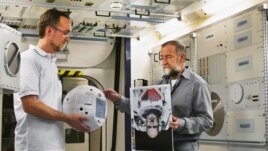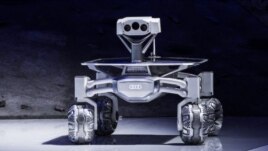07 March, 2018
Among today's hottest selling personal technology devices are "smart" digital assistants for the home.
Google Home, Amazon Echo and Apple HomePod are all artificial intelligence (AI)-powered systems that respond to voice commands. The systems connect to the internet to look up information, play music or movies, or control household devices.
Now, researchers have developed the first AI assistant for use in space. European aerospace company Airbus cooperated with U.S.-based IBM on the system. It will be deployed to the International Space Station (ISS) during a mission in June.
Airbus says it is the first time an AI system will be used aboard the ISS.

CIMON project manager Till Eisenberg (left) and Josef Sommer, CIMON GNC Team Leader at Airbus, are testing CIMON with images of Astronaut Alexander Gerst. (Airbus)
The assistant is called CIMON, which stands for Crew Interactive Mobile Companion. It is a round device weighing about five kilograms. It is designed to move around by itself and follow the movements of humans. It has a computer-like display in front for showing many kinds of information.
An official from Airbus describes it as "a kind of flying brain" designed to support astronauts in their daily work. The digital "brain" is powered by IBM's AI processing system called Watson.
Just like digital assistants for the home, CIMON uses AI to learn and predict human behaviors from repeated interactions over time. The system is trained to recognize voices and faces so it can respond directly with people.
CIMON will be tested by German astronaut Alexander Gerst during the European Space Agency's upcoming Horizons mission aboard the ISS from June to October. Gerst will command the space station during the second half of the mission.
Flight tests will be carried out before the mission to make sure CIMON operates correctly in conditions of weightlessness.
Gerst will perform three specific experiments with CIMON. One will examine the effects of space on crystals. He will also team up with CIMON to solve a Rubik's cube. A third medical experiment will use CIMON as a "smart" flying camera.
The researchers say these experiments are just a start. They hope to use CIMON to interact and assist astronauts on many future missions. They especially see the system as an important safety tool that can provide early warnings signs of technical problems in space that may not be seen by ground controllers.
Till Eisenberg is one of Airbus' lead researchers on the project. He says in addition to providing the crew with important information and instructions, the system will closely observe astronaut behavior.
"We want to study the psychological effects of long space missions on crew members and try out suitable countermeasures, especially those that reduce stress," Eisenberg said.
Mobile 4G network on the moon
In another space-tech development, it was recently announced that the Moon will be getting its own mobile 4G phone network. The new network - a project between Vodafone Germany and Nokia – will be in place sometime next year, the companies say.
The question many people are asking is: Why is such a network even needed on the moon? The answer: 2019 is the year the first privately-financed mission to the moon is set to launch.
The Mission to the Moon project is being led by Germany's PTScientists. The group has promised to launch a moon lander and two small rovers aboard a SpaceX Falcon 9 rocket next year.
Vodafone officials say the special "space-grade" mobile network will only require a small piece of equipment weighing less than one kilogram.
The company says the network should allow two moon vehicles - designed by German automaker Audi - to communicate and send scientific data and HD video back to earth.

The Audi Lunar quattro is a cutting-edge lunar rover designed by PTScientists in conjunction with a technical team at Audi.(PTScientists)
The head of Germany's PTScientists, Robert Boehme, said the private moon project marks an important first step for new exploration of the solar system in years to come.
"In order for humanity to leave the cradle of Earth, we need to develop infrastructures beyond our home planet. With Mission to the moon, we will establish and test the first elements of a dedicated communications network on the moon."
Next year's planned mission comes exactly 50 years after the first American astronauts landed their Apollo 11 spacecraft and became the first humans to walk on the moon.
I'm Bryan Lynn.
Bryan Lynn wrote this story for VOA Learning English. Hai Do was the editor.
We want to hear from you. Write to us in the Comments section, and visit 51VOA.COM.
_______________________________________________________________
Words in This Story
digital – adj. using or related to computer technology
artificial intelligence – n. the ability of a machine to reproduce human behavior
display – n. electronic device (such as a computer monitor) that shows information
suitable – adj. acceptable or right for something
countermeasure – n. an action intended to stop or prevent something dangerous or bad
stress – n. feelings of worry caused by difficult situations
network – n. system of computers or devices that are connected to each other
rover – n. vehicle used for exploring the surface of a planet
infrastructure – n. the bridges, roads, and buildings required for an activity
dedicated – adj. designed to be used for a particular purpose